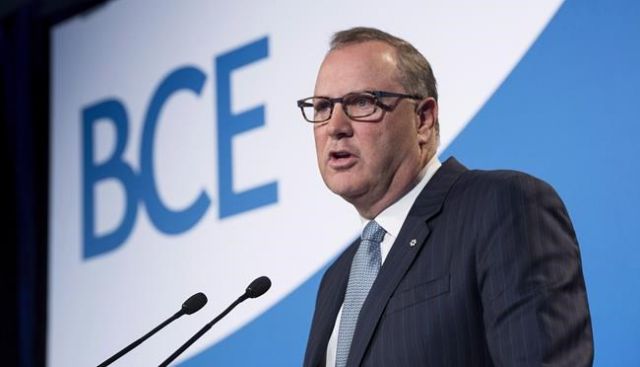
Telecommunications giant BCE Inc. says its second-quarter earnings increased by eight per cent from the same time last year, driven by strong subscriber growth including some of its best wireless customer acquisitions since 2001.
The owner of Bell Canada, CTV and numerous other businesses says its net income attributable to shareholders in the most recent quarter was $761 million, or 85 cents per share, up from $704 million in the same quarter of 2018.
Operating revenue was up 2.5 per cent to $5.93 billion from $5.8 billion in the year-ago period. Its adjusted earnings, which exclude one-time items, were up nine per cent to $847 million, or 94 cents per share.
Analysts expected adjusted earnings of 90 cents per share and $5.9 billion in revenue during the quarter, according to financial markets data firm Refinitiv.
The Montreal-based wireless, internet, cable and media company reports 185,667 total net customer additions in wirelesss, retail internet and IPTV segments, a growth of 25.5 per cent from the same quarter a year ago.
In its wireless segment, which operates under the Bell, Virgin and Lucky brands, BCE added 149,478 customers, up 30.6 per cent compared to the year-ago period, and the best performance for a second quarter since 2001.
The company added 102,980 postpaid and 46,498 prepaid wireless subscribers in the quarter, besting analysts expectations.
Bell’s media segment — which owns TSN and an indirect stake in the Toronto Raptors — also performed well. Revenue was up 6.4 per cent, as a record 7.9 million viewers tuned to Bell stations to watch the NBA team win its first-ever championship.
“We significantly increased net new subscribers to our wireless, retail Internet and IPTV services, achieved our fourth consecutive quarter of growth in business markets, and again led the Canadian media industry in audience expansion and programming innovation,” BCE president and chief executive officer George Cope said in a statement.
Analyst Aravinda Galappatthige of Canaccord Genuity said the addition of 103,000 postpaid customers was “a strong result considering recent softness in volumes across the market.”
He had estimated Bell would add 94,000 net postpaid subscribers during the quarter, a decline from last year due to generally slower subscriber growth and fewer additions from a major federal contract that Bell won in 2018.
RBC Capital Markets had a similar estimate of 95,000 net additions to its postpaid subscriber base, plus 26,000 net additions to its prepaid wireless services, prior to the announcement.
The Big Three telecom players have been competing hard for wireless customers in recent months on two new fronts: no overage fees for exceeding monthly data limits and financing plans for buying new devices.
Bell, and competitors Rogers Communications Inc. and Telus Inc. began selling no-overage fee wireless data plans for the first time in June, adopting a strategy that Freedom Mobile has used for more than a year.
Bell appears to be winning more competitors than its biggest rival Rogers, which last month said net additions to its postpaid wireless services were down sharply from the same period of 2018. The company added 77,000 postpaid subscribers, compared with 122,000 a year earlier, and below a consensus estimate of 89,000.
Most recently all three have introduced new financing options that allow customers to spread the cost of new devices over several years.


